I can't stop thinking about these Za'atar Roasted Young Potatoes! They have such a wonderful Middle eastern savory flavor thanks to za'atar seasoning—a little nutty, a earthy, garlicky, and herby. After biting into the crispy potatoes, you'll be greeted with warm, fluffy, delicate, slightly sweet creamy texture on the inside that you love about young potatoes.
This is the perfect side dish! So easy to make with 3 main ingredients and so satisfying. And this potato side dish happens to be gluten-free and vegan / vegetarian.

Jump to:
What is za'atar?
Za'atar is one of my favorite seasoning mixtures because it has aromatic dried herbs (such as thyme, oregano, and marjoram), savory spices, and nutty toasted sesame seeds. It also has a little natural lemony flavor thanks to sumac. It's just a really wonderful flavor combination that is very unique, without being overpowering.
It has a bit of a crunch in addition to flavor, and it's so wonderful.
Za'atar is used in Middle eastern cuisines, and like all ancient spice mixes, it can vary widely depending on where it is from. I use za'atar for one of my favorite EASY lunches: Smashed Chickpea Pitas with Za'atar. Give them a try for a super quick 10 minute no-cook vegetarian lunch.
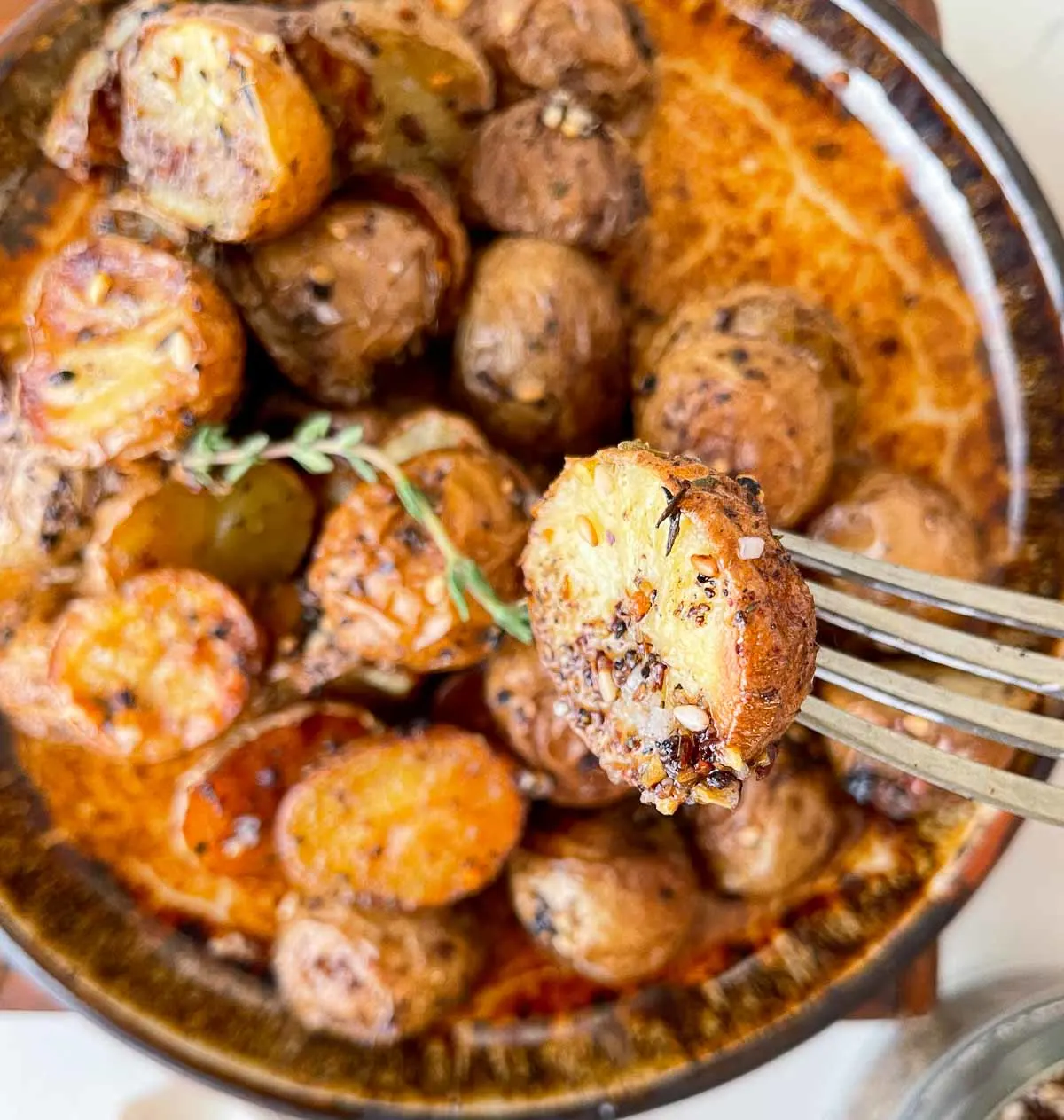
More spice mixes to try: Make your own homemade pistachio dukkah!
Where to find za'atar
Za'atar is available at Middle eastern, Lebanese, and Egyptian grocery stores, and in large American grocery stores with a good spice selection. You can also get it on Amazon. I recommend buying small container of it (such as this za'atar without any preservatives) because it tastes best when it is fresh, so you'll be able to use it up easily before it loses some of its aroma. Keep reading below for other za'atar recipe ideas!
Related recipe: Calamari Potato Salad
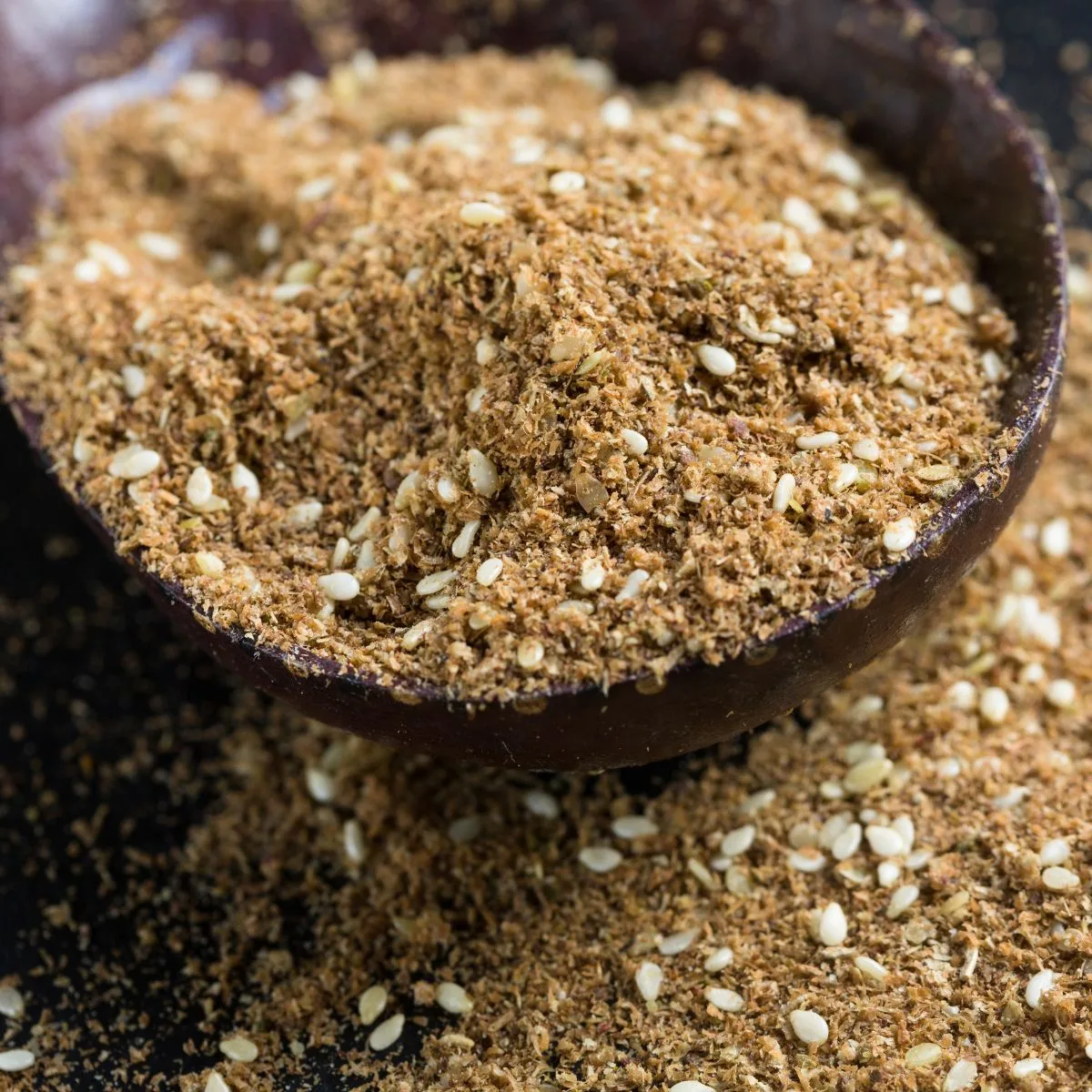
Za'atar potatoes
Za'atar is the perfect seasoning for potatoes because it complements their flavor really well. It adds a little crunch to the crispy roasted potato skins, with the toasted sesame seeds that get nice and fragrant while the potatoes are roasting.
All you need to make za'atar potatoes is a little za'atar seasoning, granulated garlic flakes (or garlic powder or fresh garlic), salt, and olive oil.
The heat in the oven takes care of the rest while the potatoes are roasting. You'll end up with crispy browned edges that feel so perfect when you bite into the potatoes, followed by the wonderful creamy texture of young potatoes.
Related recipe: Crispy Skin Young Potatoes with Herbs
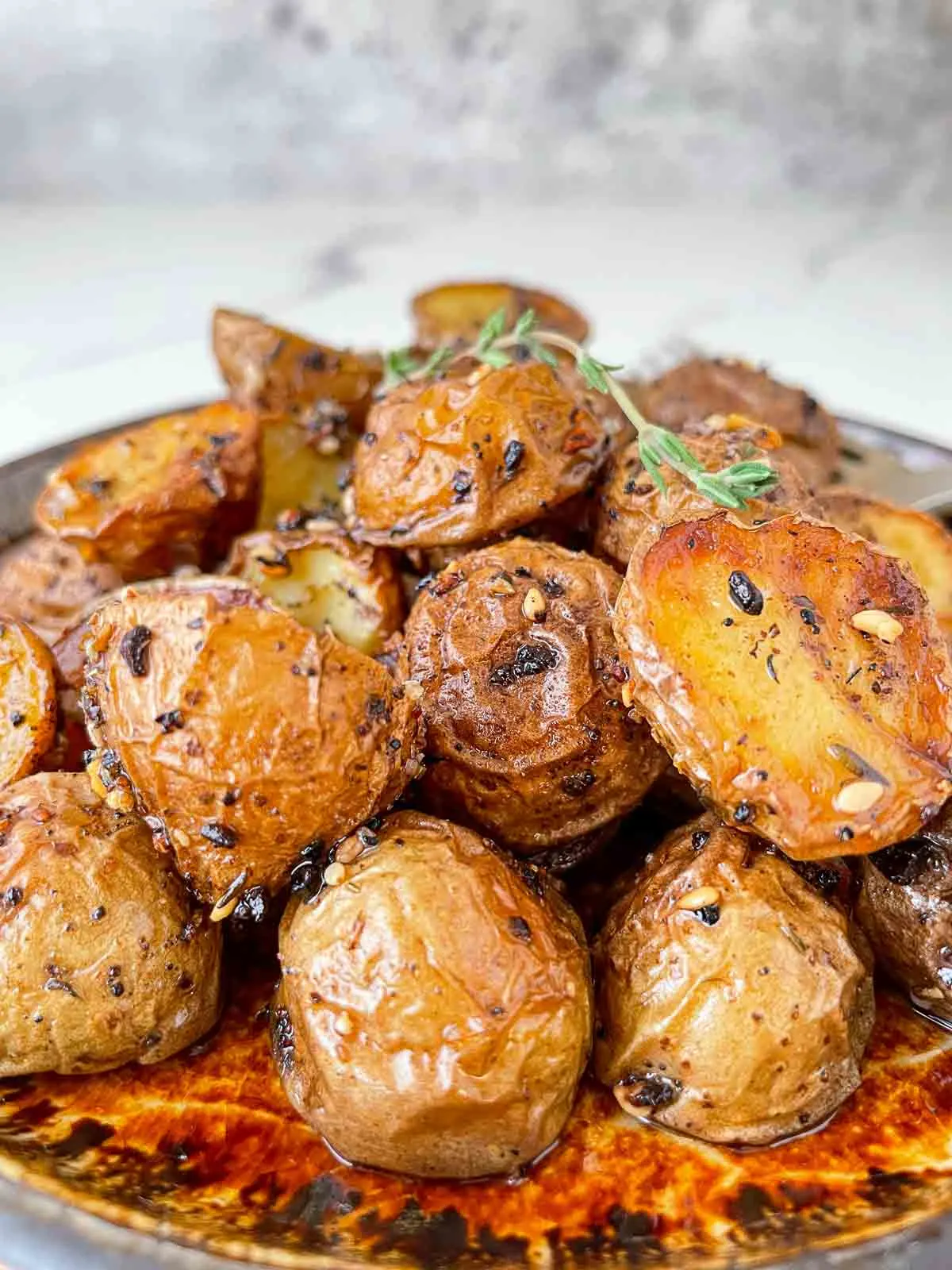
Ingredients
- 1.5 - 2 lb young potatoes (you can probably make this with canned potatoes, see my canned potatoes recipes list to get an idea for the cook time)
- 3 tablespoons olive oil (you can cut down to 2 tablespoons to reduce the calories, but 3 tablespoons makes for the tastiest, crispiest roasted potatoes)
- 2 tablespoons za'atar
- 2 teaspoons granulated garlic flakes (or use 1 teaspoon garlic powder, or 1-2 cloves fresh minced garlic)
- 1 teaspoon sea salt
- Optional garnish: Diced fresh herbs (parsley, thyme, cilantro)
- Optional: Sumac (a nice citrusy seasoning that is in za'atar) or a squeeze of lemon juice for serving
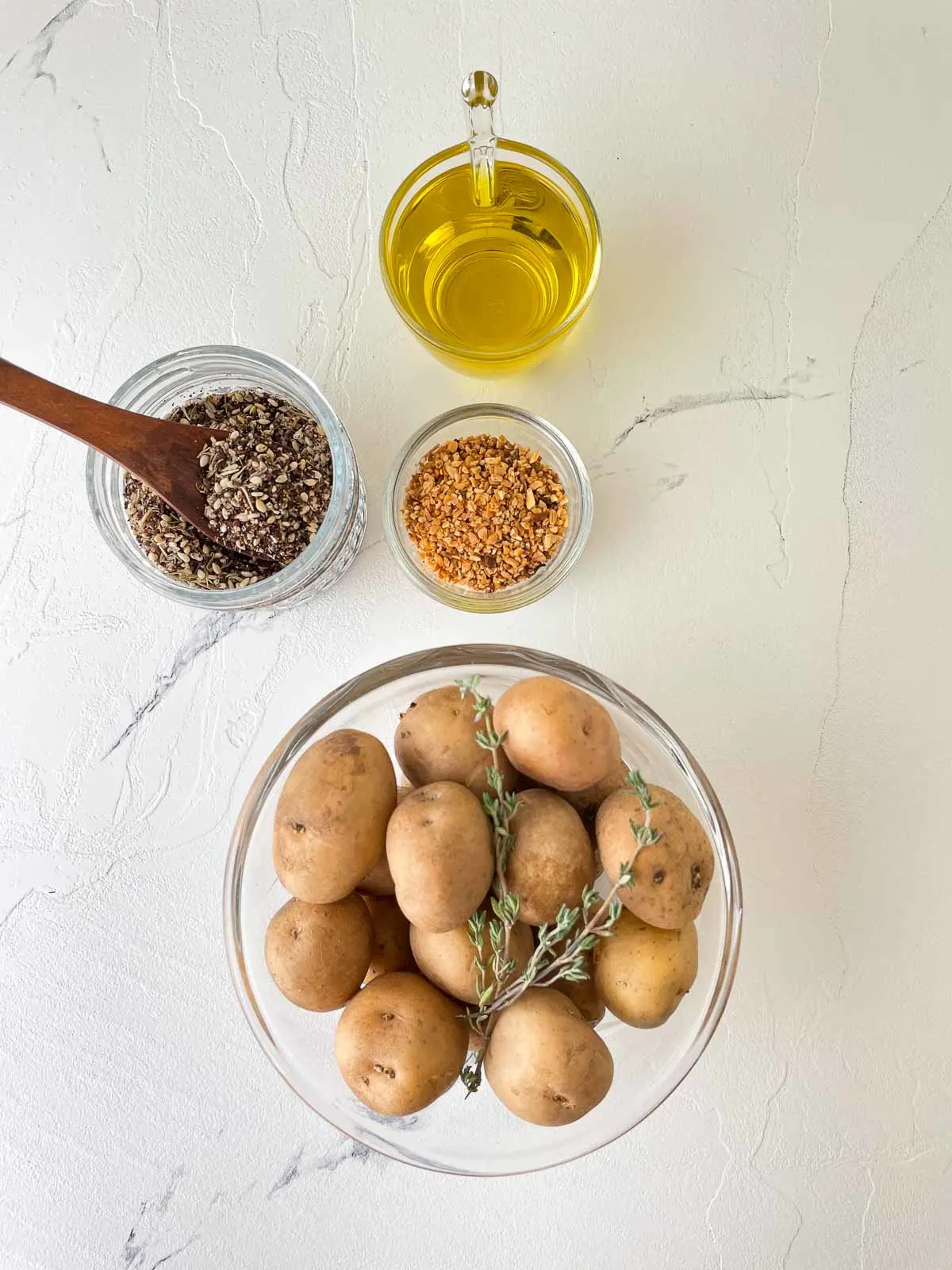
Related recipe: Sauteed Potatoes and Mushrooms
Equipment
- Cutting board and knife
- Small bowl
- Baking sheet
Related recipe: Truffle Parmesan Potato Wedges
Instructions
Step 1: Preheat oven to 400F. The hot temperature helps make crispy browned edges and skins that we love in roasted potatoes!
Step 2: Scrub the potatoes clean and pat them dry. Slice them in half (or in thirds or quarters if they're large). Spread the potatoes on the baking sheet.
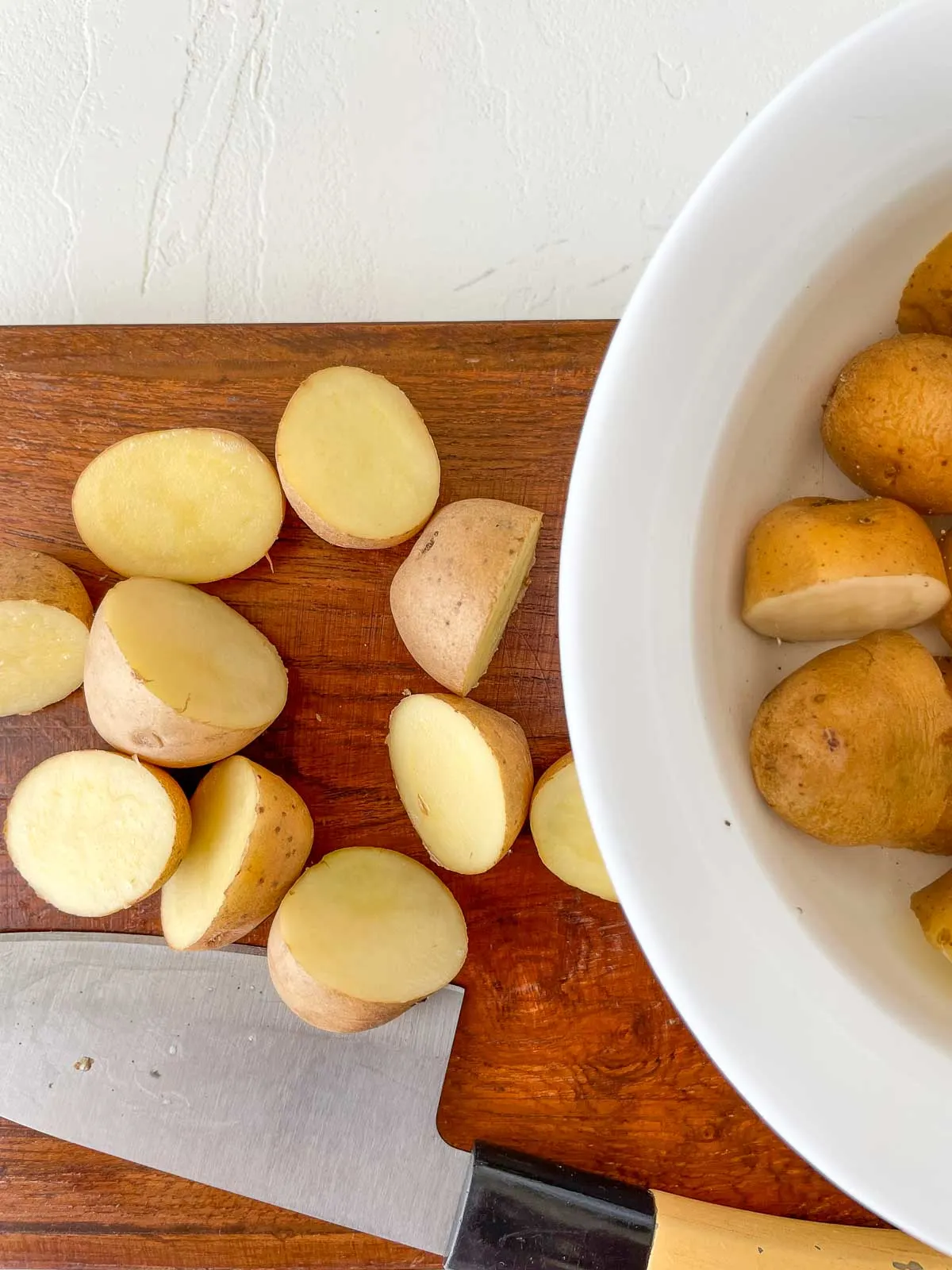
Step 3: In a small bowl, combine the olive oil, za'atar, granulated garlic, and sea salt. Mix well.
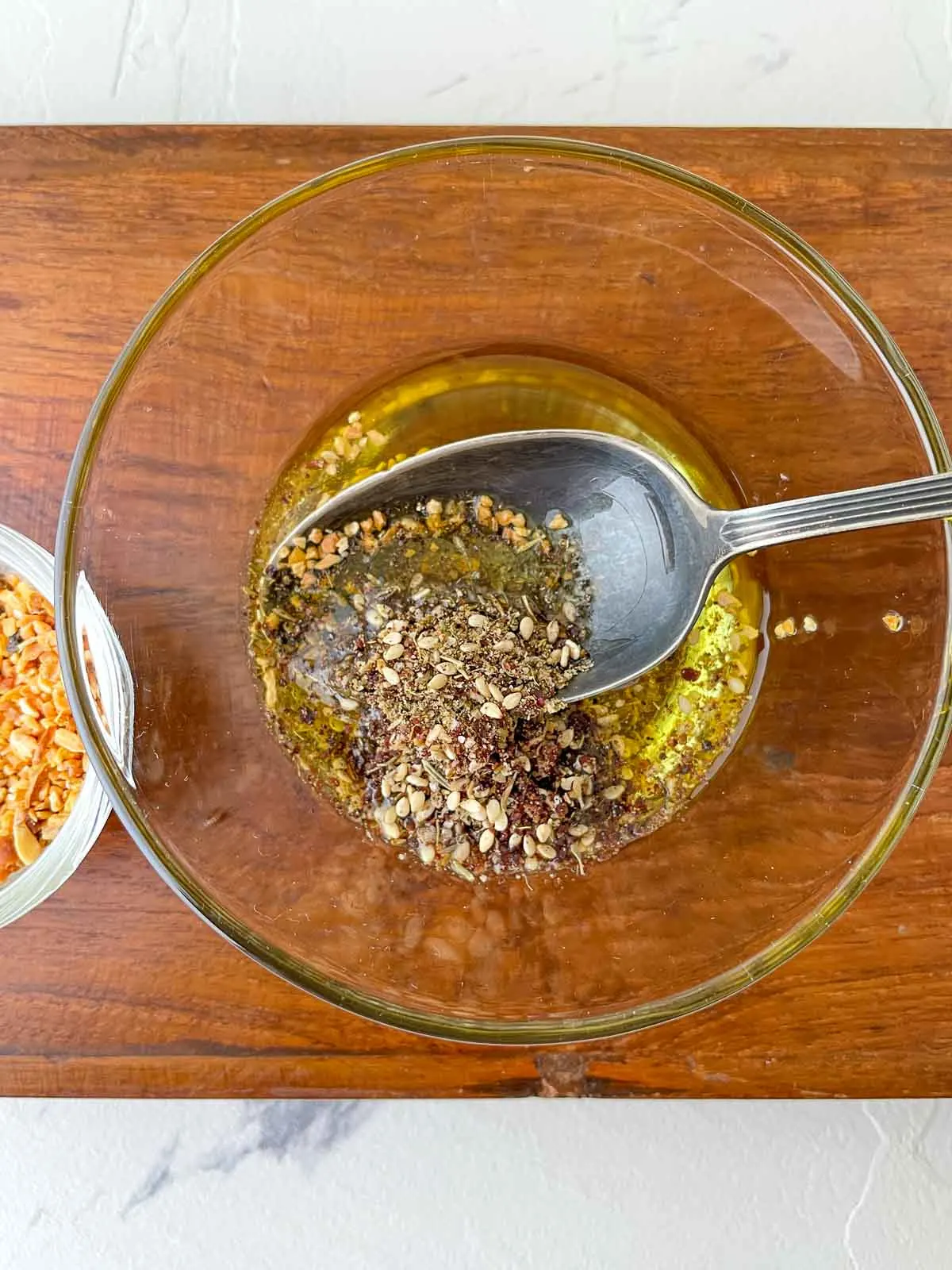
Step 4: Drizzle the seasoning mixture on the potatoes and stir together really well until the potatoes are fully coated in seasoned olive oil.
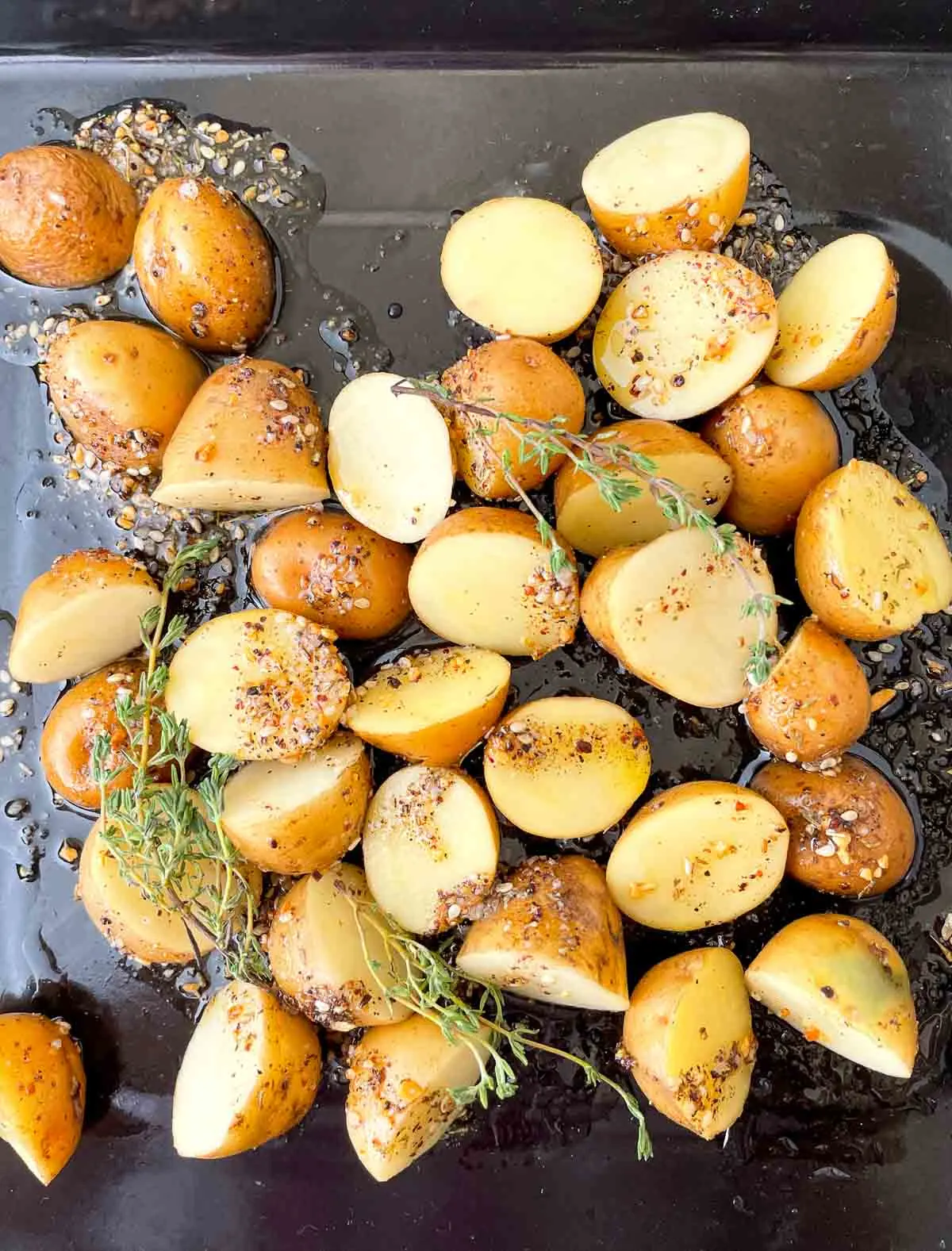
Step 5: Roast potatoes at 400F for 20 minutes. Carefully stir them around and roast for another 15 minutes, or until the potatoes are cooked through and a fork is easily inserted into the center.
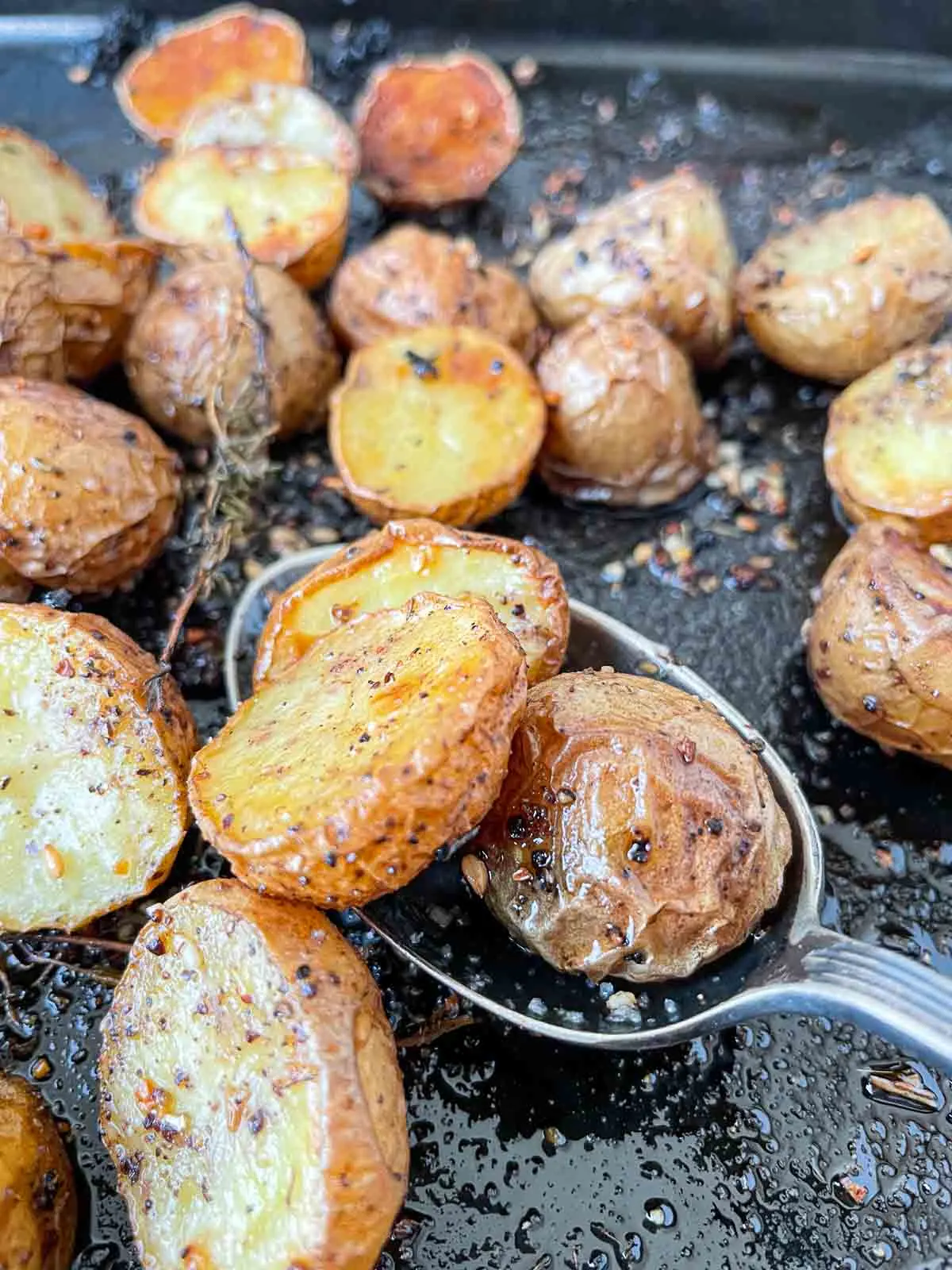
Step 6: Serve warm, garnishing with fresh herbs, a pinch of sumac, or a squeeze of lemon juice.
More Middle eastern-inspired recipes to try: Couscous Tabbouleh Salad
What to serve with za'atar potatoes
I can eat a plate of za'atar potatoes for lunch, with a fried egg on the side for a little protein. You can make some yellow squash tots or cauliflower fritters to add some veggies.
If you want to eat a complete meal out of these za'atar roasted potatoes, serve them along air fryer chicken quarters, chicken kofta kebabs or some grilled chicken. A quick side salad, such as this cucumber tzatziki salad would also be wonderful with crispy roasted potatoes because it's creamy and provides a different texture.
More potato recipes to try: Draniki
Can I make za'atar potatoes with large potatoes?
If you don't have young potatoes, you can use whatever potatoes you have on hand: russet, yukon, or red potatoes will work fine. Just scrub them clean, pat them dry, and chop them into 1-1.5 inch pieces. Season them following this recipe, roast, and enjoy!
More young potato recipes: No-Mayo Potato Salad with Feta and Olives
Leftover za'atar potatoes
Leftover roasted potatoes are best reheated in an oven or an air fryer to get their crisp back. They will still be really delicious when reheated the next day, and you can add a drizzle of olive oil before reheating if they seem a little dry.
You can also use leftover za'atar potatoes in other recipes, such as chopping them up further and adding them to a potato kale frittata or adding them to a salad with roasted vegetables.
More Middle Eastern-inspired recipes to try: Dukkah Chicken
What else can I make with za'atar?
Za'atar is a wonderful seasoning to use on any roasted vegetables: it's great with sliced zucchini, sliced bell peppers, roasted carrots, Brussels sprouts, or anything else you want to roast! Roasted Jerusalem artichokes would also be great with Za'atar. Give it a try!
In fact, you can roast the veggies seasoned with za'atar at the same time as the potatoes, just check on them after 15 minutes because they will cook faster than the potatoes.
Za'atar is also great in savory yogurt sauces, it would be great in the yogurt dip I use for these sweet potato leek latkes or these yellow squash tots. It's great sprinkled on pureed soups, such as this carrot soup or asparagus leek soup.
As I said above, I recommend buying a small container of za'atar so that you can use it up while it's fresh, but don't worry—once you taste it, you'll be sprinkling it on everything!
If you enjoyed this recipe, let me know with a comment and a star rating below. And don't forget to share it on Facebook and save it on Pinterest for later!
Za'atar Roasted Potatoes
Ingredients
- 1.5 - 2 lb young potatoes - (about 20-25 young potatoes)
- 3 tablespoons olive oil - (see notes)
- 2 tablespoons za'atar
- 1 tablespoon granulated garlic flakes - (see notes for substitution)
- 1 teaspoon sea salt
- Optional garnish: fresh diced herbs, thyme, sumac, a squeeze of lemon juice
Special equipment
- Cutting board and knife
- Small bowl
Instructions
- Preheat oven to 400F.
- Scrub the potatoes clean and pat them dry. Slice them in half (or in thirds or quarters if they're large). Spread the potatoes on the baking sheet.
- In a small bowl, combine the olive oil, za'atar, granulated garlic, and sea salt. Mix well.
- Drizzle the seasoning mixture on the potatoes and stir together really well until the potatoes are fully coated in seasoned olive oil.
- Roast potatoes at 400F for 20 minutes. Carefully stir them around and roast for another 15 minutes, or until the potatoes are cooked through and a fork is easily inserted into the center.
- Serve warm, garnishing with fresh herbs, sumac, or a squeeze of lemon juice.
Notes
- Olive oil: You can cut down to 2 tablespoons to reduce the calories, but 3 tablespoons makes for the tastiest, crispiest roasted potatoes.
- Granulated garlic: You can substitute with 1 teaspoon garlic powder, or 1-2 cloves fresh minced garlic.
- Try roasting veggies (sliced zucchini, bell peppers, Brussels sprouts) with the same seasoning mix on a separate baking sheet, just check on the veggies after 15 minutes.
- The nutrition facts are estimated assuming 1.5 lb of potatoes.
Nutrition
The nutritional information displayed is an estimate and not to be used as dietary or nutritional advice. Consult a nutritionist or dietician for nutritional info based on the exact ingredients you use.


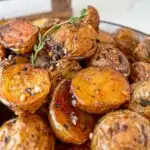
Traevynn
Sunday 27th of August 2023
Made this recipe for the first time today and will definitely keep this in my meal rotation. I added some crystalized lemon (not sweetened) for a bit of a kick and will add a little more next time. I also added some smoked paprika (~1 tsp) to the mixture. After cutting the potatoes, I tossed them in the spice/oil mix rather than drizzle the mixture over them and got a much better coating that way. My gas oven tends to run hot so next time, I'll likely reduce the heat slightly and cover the potatoes with foil after stirring them so they don't dry out as much. They went beautifully with the Baked Panko Breaded Pork Chops from the Good In The Simple recipe. Thank you for such a great tasting recipe and for introducing me to za'atar seasoning! :)